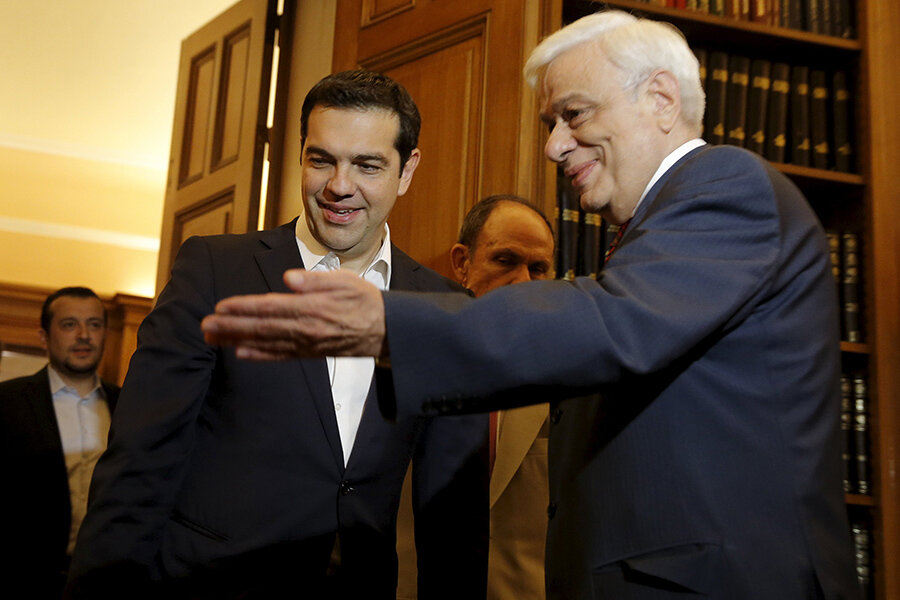Greece proposes three-year financial rescue plan by Europe
Loading...
| Athens, Greece
Greece requested a new three-year rescue program from its European partners on Wednesday and rushed to complete a detailed plan of economic reforms in time to avoid the country's descent into financial chaos.
With the banking system teetering on the edge of collapse, the government sought to reassure its European creditors that it would enact tax and pension reforms quickly in exchange for loans from Europe's bailout fund, the European Stability Mechanism.
In its formal request to tap the fund, the Greek government said it would "immediately implement a set of measures as early as the beginning of next week."
After months of fruitless negotiations with the Greek government, the skeptical European creditor states have said they want to see a detailed, cost-accounted plan of the reforms by Thursday. That is meant to give the creditors enough time to review the plan before leaders of the European Union's 28 countries meet on Sunday in what has been termed as Greece's last chance to stay in the euro.
In the letter, the Greek government said it was aiming to be able to finance itself once the new aid program is over in three years.
Without a deal, Greece faces an almost inevitable collapse of the banking system, which would be the first step for the country to fall out of the euro.
Markets are holding up despite the apparent ultimatum, with many investors predicting a last-minute deal. The Stoxx 50 index closed up 1 percent.
"Guarded optimism is the theme today, as the eurozone gives Greece one final deadline," said Chris Beauchamp, senior market analyst at IG in London.
Prime Minister Alexis Tsipras, addressing lawmakers at the European Parliament, said his country is seeking a deal that would bring a definitive end to his country's financial crisis. Greece has had two bailouts from its European partners and the International Monetary Fund since May 2010, totaling 240 billion euros ($260 billion).
"We need to ensure the medium-term funding of our country with a development and growth program," Tsipras told lawmakers in Strasbourg, France.
The head of France's central bank said he feared the "collapse" of the Greek economy and "chaos" if Greece doesn't strike a deal by Sunday.
In unusually strong language, Christian Noyer told Europe-1 radio he predicted "riots" in Greece if no deal is reached. He also indicated the European Central Bank would effectively pull the plug on its emergency liquidity measures for Greek banks if no deal is struck.
Greece's main business and tourism associations predicted an "explosion of unemployment" if no deal is reached.
Tsipras insisted he has "no hidden agenda" to drive Greece out of the euro and that last Sunday's referendum result, in which voters soundly rejected a previous creditors' reform proposal, does not mean a break with Europe.
Applause rose from left-wing quarters in the EU Parliament when Tsipras said aid to Greece only helped out banks, not ordinary Greeks. A few called for compromise.
The head of a conservative group in the parliament, Belgium's Guy Verhofstadt, said he was "furious" at Tsipras' failure to spell out specifics of his reform plans.
In Greece, meanwhile, people were struggling with an eighth day of limits on money withdrawals and closed banks. Greeks cannot take out more than 60 euros ($67) a day from ATMs and are unable to send money abroad, including to pay bills or to stock their businesses, without special permission.
Tsipras said Greece's troubles predated his arrival in office in January and condemned the "austerity experiment" his country has endured over the past five years that he blames for spiraling unemployment and poverty.
"We demand an agreement with our neighbors, but one that gives us a sign that we are on a long-lasting basis exiting from the crisis — which will demonstrate to us that there is light at the end of the tunnel," he said.
Tsipras vowed to continue reforms but warned about the austerity-weariness of the public.
"This has exhausted the patience and resilience of the Greek people," he said.
The Greek crisis has frayed the nerves of other European leaders, who have accused the Greek government, elected on promises to repeal austerity, of foot-dragging and exacerbating the situation.
Highlighting the rising anger with Tsipras, European Commission President Jean-Claude Juncker had a stark warning for Greece after Tuesday's eurozone summit.
"We have a Grexit scenario, prepared in detail," he said, apparently referring to the situation in which Greece would be forced out of the currency union.
One big sticking point has been Greece's demand for some relief on its debt burden, which stands at around 320 billion euros ($350 billion), or around 180 percent of the country's annual GDP.
Germany appears to be particularly reluctant to help Greece deal with its debts if reforms aren't forthcoming.
Germany's stance is at odds with the IMF — another major creditor. In a report last week, it said European states should accept longer repayment periods and lower interest rates on their loans to Greece.
France's government has appeared willing to play mediator, though even it has said it is up to Greece to present suitable proposals for a deal.







